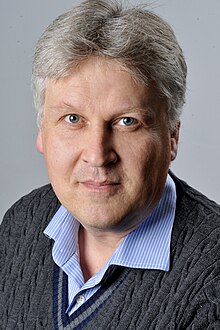Sepp Hochreiter | |
|---|---|
 Hochreiter in 2012 | |
| Born | 14 February 1967 |
| Nationality | German |
| Alma mater | Technische Universität München |
| Scientific career | |
| Fields | Machine learning, bioinformatics |
| Institutions | Johannes Kepler University Linz |
| Thesis | Generalisierung bei neuronalen Netzen geringer Komplexität (1999) |
| Doctoral advisor | Wilfried Brauer |
Josef "Sepp" Hochreiter (born 14 February 1967) is a German computer scientist. Since 2018 he has led the Institute for Machine Learning at the Johannes Kepler University of Linz after having led the Institute of Bioinformatics from 2006 to 2018. In 2017 he became the head of the Linz Institute of Technology (LIT) AI Lab. Hochreiter is also a founding director of the Institute of Advanced Research in Artificial Intelligence (IARAI).[1] Previously, he was at Technische Universität Berlin, at University of Colorado Boulder, and at the Technical University of Munich. He is a chair of the Critical Assessment of Massive Data Analysis (CAMDA) conference.[2]
Hochreiter has made contributions in the fields of machine learning, deep learning and bioinformatics, most notably the development of the long short-term memory (LSTM) neural network architecture,[3][4] but also in meta-learning,[5] reinforcement learning[6][7] and biclustering with application to bioinformatics data.
- ^ "IARAI – INSTITUTE OF ADVANCED RESEARCH IN ARTIFICIAL INTELLIGENCE". www.iarai.ac.at. Retrieved 2021-02-13.
- ^ "CAMDA 2021". 20th International Conference on Critical Assessment of Massive Data Analysis. Retrieved 2021-02-13.
- ^ Cite error: The named reference
thesiswas invoked but never defined (see the help page). - ^ Cite error: The named reference
Necowas invoked but never defined (see the help page). - ^ Hochreiter, S.; Younger, A. S.; Conwell, P. R. (2001). "Learning to Learn Using Gradient Descent". Artificial Neural Networks — ICANN 2001 (PDF). Lecture Notes in Computer Science. Vol. 2130. pp. 87–94. CiteSeerX 10.1.1.5.323. doi:10.1007/3-540-44668-0_13. ISBN 978-3-540-42486-4. ISSN 0302-9743. S2CID 52872549.
- ^ Hochreiter, S. (1991). Implementierung und Anwendung eines neuronalen Echtzeit-Lernalgorithmus für reaktive Umgebungen (PDF) (Report). Technical University Munich, Institute of Computer Science.
- ^ Arjona-Medina, J. A.; Gillhofer, M.; Widrich, M.; Unterthiner, T.; Hochreiter, S. (2018). "RUDDER: Return Decomposition for Delayed Rewards". arXiv:1806.07857 [cs.LG].